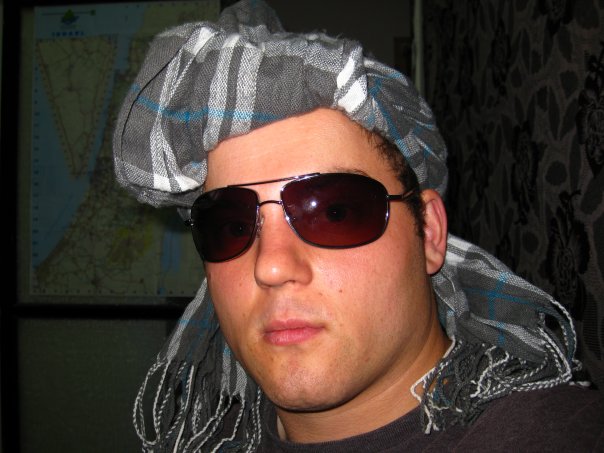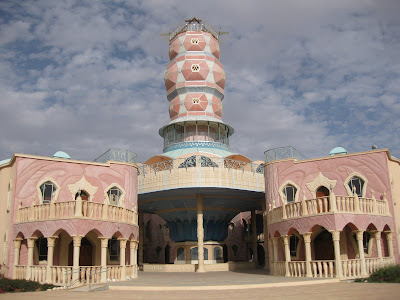
Last Sunday I took my first steps to independent travel. After struggling to find a travelling partner, I decided, with some anxiety, to go it alone.
On Sunday morning, I left for the long five-hour journey to Eilat. After arriving in Eilat, I took the bus to the Taba border where I crossed rather quickly, without hassle. Nearly 70 US later, I entered into the country (100 shekels to Israel, 70 Egyptian Pounds to Egypt) and was fortunate enough to run into a couple who were heading to a beach resort. My original plan was to stay at Basata (“Simplicity”) but they were all booked up and I would have had to schlep a tent. Instead, I decided to join them. We went to a place called “Beer Swear”, 40 km from the Taba crossing. For some interesting reason, “Beer Swear” has become an oasis for young, ‘adventurous’ Israelis looking for a good time in Sinai, but too scared to go to any of the major cities. The day basically consists of the following: wake up at 9 or 10 am, smoke hash, eat breakfast, smoke hash, sun bathe, go into the water, smoke hash, eat lunch, read a book, take a nap, go snorkeling, smoke hash, eat dinner, and smoke some more, bed. Two days of this (without smoking any hash, may I add) was more than enough for me-- and because Egypt is technically an Islamic country, alcohol is very difficult to find at these resorts. So I left feeling the need for an adventure. I took out my “Lonely Planet” and made the decision to go trek Mt. Sinai. The best way to do this is to go to Dahab, so that is what I did. I mounted the sketchy bus in the middle of the desert, passed 4 or 5 checkpoints and entered Dahab. Dahab is still considered a city for independent backpackers, so it was rather easy to find my way around. After a bit, I found a company that would take me to Mt. Sinai and back for just under 20 dollars US. I jumped on the opportunity and left at 11pm. We arrived at 1 am and started to climb. The trek is medium-hard, with many dangerous ledges. The most annoying part is having pestering Bedouins along the trail yelling “Camel”, tempting you for 60 Egyptian pounds. I am proud to say I resisted the whole way up, often saying, “No Thanks, I prefer to die”. Right before the top, my entire body was aching, a kind man (who turned out to be conveniently forget to request 70 Egyptian pounds for his services), offered me his hand. I took it grudgingly, because I was utterly exhausted. I offered him 20 pounds at the top which he refused. I told him he never told me the price, and had he told me, I would have refused. Then I took out another 10 pounds and told him to take it or leave it. You have to negotiate in Egypt or they will take you for all your worth.
After reaching the peak (it was really cold and windy), we waited for the sun to appear and made our way down. The Monastery at the bottom was a bit dull, except for the Burning Bush, which had the faithful in tears.
The next day, I awoke with the intention of finding a dive shop to certify me with a licence. I found a nice spot called “Divers Down Under”. There I met my instructor, a South African with the name Awwi (pronounced Avi). I thought he was Jewish, but turns out that his name is in Afrikaans. I learnt how to put on my gear, safety tips when in the water, how to inflate an automatic (with the bush of a button) life preserver. I also learnt how to do some safety exercises including swapping for my partner’s air and sharing air. Most importantly, I learnt how to use my lungs as buoyancy devices. When diving, it’s crucial to understand that your lungs become inflated and deflated. When you are diving with sensitive coral reef, it is vital to be aware of your surroundings and ensure that you are not close to the reef. You do this, in part, by controlling your diaphragm. The number one rule in diving is to never stop breathing. It’s not that hard to remember, but it takes some time to get used to.
The coral reef is extremely diverse and beautiful in Dahab. I didn’t have the opportunity to dive far, but from what I saw, I was in awe. I can’t wait to go back and finish my certification.
I have for some time wanted to travel on my own. I've seen friends do it and really enjoy the experience. I think you really learn a lot about yourself travelling on your own. You learn how to trust your own instincts, and be completely responsible for your own actions. I really enjoyed the freedom it provided me. I could do whatever I wanted without feeling like I was compromising my own experience for the benefit of a travel partner. It was also a great way to meet people, especially in a backpacker’s city like Dahab. I enjoyed the opportunity to be responsible for my own survival and actions. On the other hand, more than once I felt lonely, especially during my hike of Mount Sinai. Out of 7 people, 4 were couples, and 2 were friends. Best part, I only got sick once from a meat! Hah.
Travelling to an Arab country is also a unique experience. Slowly, I’ve realized the importance of separating the people from the government. I met Americans and Canadians who had travelled and lived in Libya, Syria, Iran, and Egypt. They kept telling me that the people couldn’t have been more gracious to have foreigners in their country. True, that these countries have serious questions when it comes to human rights abuses and their treatment of minorities, but it is important to appreciate this point. In the end of the day, people are people and most people want what is best for their family, namely a secure home with enough money to support their family. I can appreciate that.
 Last weekend, we landed in the Negev Desert. The Negev is a beautiful place of extremes--hot and dry in the day and cold and windy at night. We get to our starting point and begin the hike. A few hours later, we arrive at our camping site where we need to pitch tents before darkness arrives. After pitching the tent, Susy (one of the participants, begins preparations for the meal: Homemade Pizza and Chinese Stir Fry (vegetarian and Chicken options). Many hours later and with full, satisfied bellies we all try to fall asleep in the crapped quarters of the tent. My tent slept the boys, 4 of us, in a 3 person tent. Uncomfortable, Iftach (our guide), decides to sleep outside which gives all of us more room. In the middle between sleep and being lucid, we begin to hear rain drops. Not hard rain, but soft rain. Meanwhile, all of us left our stuff outside to give more room in the tents for our bodies. We were all told that the place was secure, and robbery was the last thing on our minds. Because I didn't want to get my camera, cell phone and clothes wet, I took everything inside. So did most of my tent-mates. At about 3:30 in the morning, we are awakened by Israelis who had been sleeping about 1 km from our tents. They tell us that they had been robbed by Bedouins and the we needed to check for our stuff. 3 or 4 of my group members had all their cash and valuables taken and found their bags a few feet from our tents. We were all in shock, and I was thankful to God or whatever power that be, that rain (in the desert of all places) got me to take my things into my tent; otherwise, I'd be writing this without my Canon camera or iPod!
Last weekend, we landed in the Negev Desert. The Negev is a beautiful place of extremes--hot and dry in the day and cold and windy at night. We get to our starting point and begin the hike. A few hours later, we arrive at our camping site where we need to pitch tents before darkness arrives. After pitching the tent, Susy (one of the participants, begins preparations for the meal: Homemade Pizza and Chinese Stir Fry (vegetarian and Chicken options). Many hours later and with full, satisfied bellies we all try to fall asleep in the crapped quarters of the tent. My tent slept the boys, 4 of us, in a 3 person tent. Uncomfortable, Iftach (our guide), decides to sleep outside which gives all of us more room. In the middle between sleep and being lucid, we begin to hear rain drops. Not hard rain, but soft rain. Meanwhile, all of us left our stuff outside to give more room in the tents for our bodies. We were all told that the place was secure, and robbery was the last thing on our minds. Because I didn't want to get my camera, cell phone and clothes wet, I took everything inside. So did most of my tent-mates. At about 3:30 in the morning, we are awakened by Israelis who had been sleeping about 1 km from our tents. They tell us that they had been robbed by Bedouins and the we needed to check for our stuff. 3 or 4 of my group members had all their cash and valuables taken and found their bags a few feet from our tents. We were all in shock, and I was thankful to God or whatever power that be, that rain (in the desert of all places) got me to take my things into my tent; otherwise, I'd be writing this without my Canon camera or iPod!

